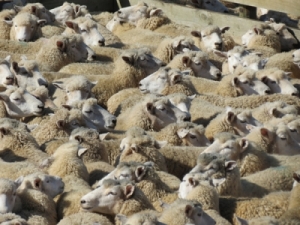Top wool advocate bales out
The conversion of productive farmland into trees has pretty much annihilated the wool industry.
 The North Island wool auction received revived support this week with an improved 81% of the 5700 bales selling.
The North Island wool auction received revived support this week with an improved 81% of the 5700 bales selling.
The North Island wool auction received revived support this week with an improved 81% of the 5700 bales selling.
New Zealand Wool Services International Ltd's chief executive, John Dawson reports the weakening NZ dollar across the board saw the weighted currency indicator fall 4.22%.
Despite these positive factors, local prices were still below last week's South Island auction, but only marginally under the last more comparative North Island selection.
Dawson reports that compared to the North Island sale on the July 7, fine crossbred shears ranged from 2% cheaper to 2% dearer. Coarse good colour full fleece were nominally firm with the average style 1 to 2% cheaper.
Coarse crossbred early shorn were 1% cheaper, longer shears firm to 1% dearer with shorter types firm to 2% easier.
Short oddment remained firm.
Limited interest with renewed activity from Western Europe adding a steadying influence, supported by Australasia and the United Kingdom, with India, Middle East and China sparingly.
The next sale on July 28 comprises about 7400 bales from the South Island.
The World Wide Sires National All Day Breeds Best Youth Camp Best All Rounder plaudit has become family affair, with 2026 Paramount Cup winner Holly Williams following in her sister Zara's footsteps.
DairyNZ is giving New Zealand farmers a unique opportunity to gain hands-on governance and leadership experience within the dairy sector.
Herd improvement company LIC has posted a 5.2% lift in half-year revenue, thanks to increasing demand for genetics.
According to the latest Fresh Produce Trend Report from United Fresh, 2026 will be a year where fruit and vegetables are shaped by cost pressures, rapid digital adoption, and a renewed focus on wellbeing at home.
The Roar is a highlight of the game hunting calendar in New Zealand, with thousands of hunters set to head for the hills to hunt male stags during March and April.
OPINION: The past few weeks have been tough on farms across the North Island: floods and storms have caused damage and disruption to families and businesses.